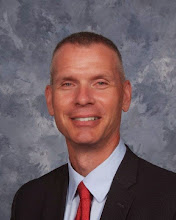I have included a comment from the last blog posting for your perusal. A friend of mine (and the school district) commented about the tension that can easily exist when you use technology to "open the world" to your students while at the same time helping students appreciate where they live. I have literally lost sleep over this question. We must provide the students in the school district the education that will allow them to thrive in the 21st century. I believe this includes the ability to sort and make sense of an incredible amount of information AND learn the culture, mores, and significance of their local community. In other words, how does the school district foster global citizenship while at the same time teaching the importance of the local community? One simple way to accomplish this task is to encourage the students to become involved in, and learn about, their heritage. This involves more than just their American heritage, but the heritage of their ancestors. Just a thought. I love this comment because it strikes at the heart of the matter.
Tom,
Great stuff here. It's good to see RASD on the cutting edge. I have two observations.
This first regards the "amount of information." I wonder about the implications. Even back in the encyclopedia days, when the amount of information was limited, most students didn't really engage with it. The best students, sure. But the struggling students? Even then, the "amount" of info seemed to exceed their grasp. I wonder if the more important development is the "variety" of information. That is, it seems like it might be a lot easier for a student to hook into a topic or a field that he or she finds worthwhile. So the kid who hated the textbook version of the Civil War might fall in love with the Shelby Foote version, or the Michael Shaara version. Or might come at it through the world of art or antiques or soldier memoirs. So it's not that we are going to cram more material into the kids' heads, but we might be able to make them more willing to cram it in there themselves.
On the (potential) downside... what does this mean for the concept of place-based learning? I have a strong affinity for the local, in terms of culture and heritage. And I think it's great to expose students to as much culture and heritage as possible. But when everyone has access to everything, does anybody truly own or occupy anything? I have to be careful about this argument, as it can easily cascade into a plea for holding people back, or limiting options. But think in terms of something seemingly simple like cuisine. We love that that there are regional versions of certain dishes in Italy, and that Memphis has a different way of doing BBQ than does Kansas City. One way to perpetuate these interesting variations is to pass them along to the kids. And one way to do that is to raise them with that cuisine, do develop in them a bias.
Is there a way to continue passing this bias along, but still giving kids access to the whole world? Can we convey preferences AND options?
I'm not at all sure.
Subscribe to:
Post Comments (Atom)



Sam,
ReplyDeleteI see that you are not familiar with education, so I will take it upon myself to educate you. I will go slow so you can keep up.
First, after talking to some educators in the classroom, their concern is that this will take from structured concepts of book learning. As we all know, when you get to higher level academics the ability to study from written text is crucial to the learners success. Which leads us to what the internet is in education, a resource tool. Being able to log in and let a student teach his or her self is not what education is supposed to be about.
Second, Tax payers are not going to want to hear about their teachers facilitating(see I can use big words too) information created for them by blended schools. They want their teachers in the classroom teaching. If a program "opens the world up to a student," it should be used in the context of a structured assignment.H ow easy is it going to be for a teacher to tell his or her students this, "Your assignment is on blended school, you have forty minutes to finish it." What is the teacher going to be doing then? Quick answer, sitting at his or her desk playing on the computer. Before you tell me this won't happen, better take a good look at what goes on in the classrooms at RHS and the Elementary school. I know for a fact that a certain fifth grade teacher has had his computer taken from him in recent years for playing on it too much. We need teachers teaching not putting assignments on a website and letting the kids do it for themselves.
Lastly, when you say cutting edge, you are greatly mistaken. Since the last great administrator left, Ridgway has been falling behind. Most schools in the eastern and southern part of this state have tried blended schools already and have gone away from it due to the problems that I have mentioned above.
As you can see, access to information is great as long as it is used in the proper context of what teaching is.
Now you are educated!